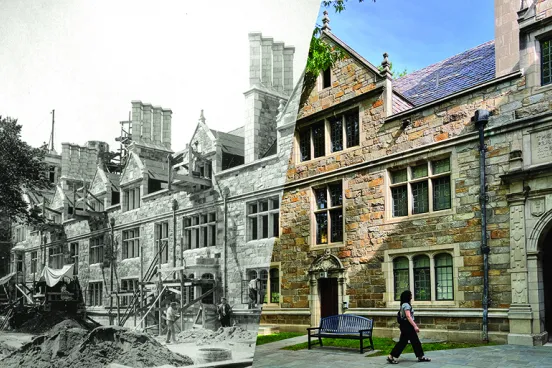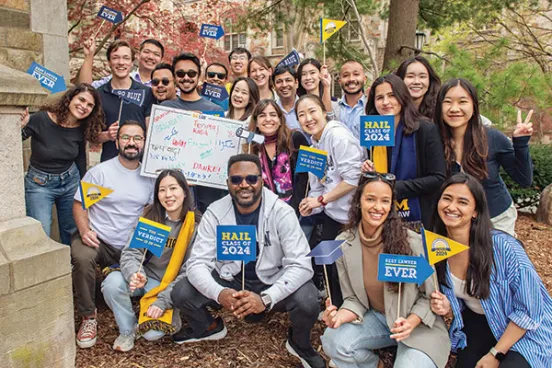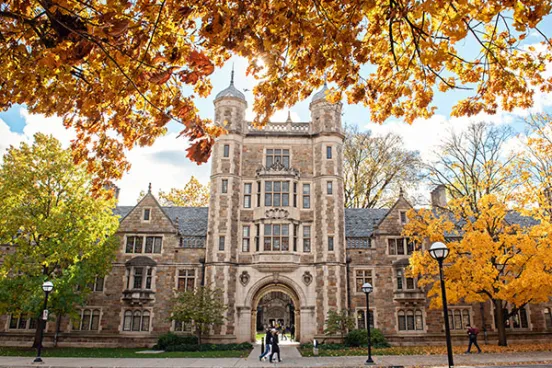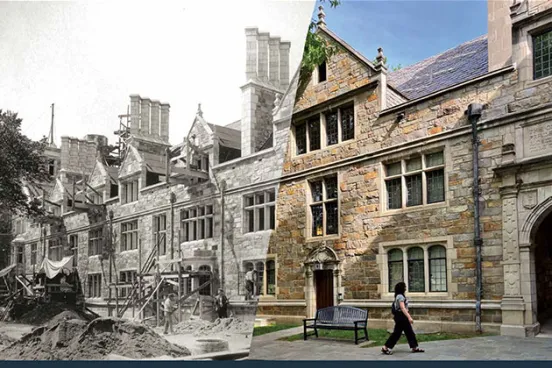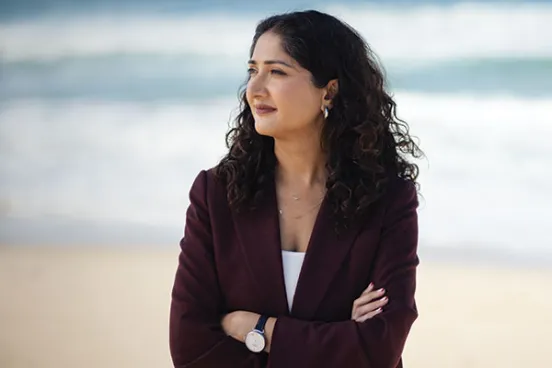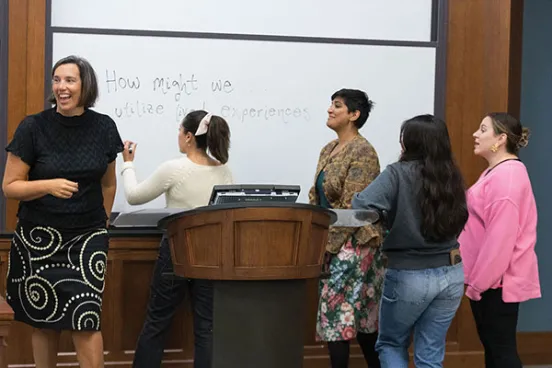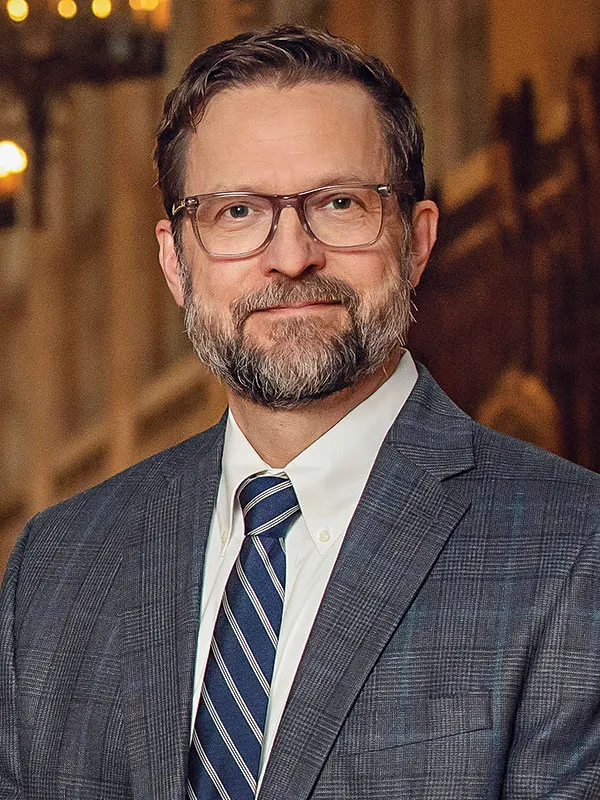
Following the conclusion of Mark West’s decade-long tenure as the David A. Breach Dean of Law at the end of 2023, Kyle Logue has assumed the deanship on an interim basis while the University conducts its search for a permanent replacement. U-M Provost Laurie McCauley has assembled a search committee to lead that effort. (West remains on the faculty as the Nippon Life Professor of Law.)
Logue, the Douglas A. Kahn Collegiate Professor of Law, joined the Michigan Law faculty in 1993. An expert in tax, torts, and insurance law, his scholarly interests also encompass economics, psychology, and philosophy. He has served in several administrative roles at the Law School, including as the associate dean for academic affairs and the associate dean for faculty and research.
Before joining the faculty, Logue practiced law in Atlanta at Sutherland, Asbill & Brennan (now Eversheds Sutherland). He holds a bachelor of arts in political science from Auburn University and a JD from Yale University.
Logue recently sat down with Law Quadrangle to discuss his new role, what he loves about Michigan Law, and more.
Why did you agree to be the interim dean?
Having been here as a professor for more than 30 years, Michigan Law is simply a part of who I am. I love the place—the students, the faculty, the staff, even the buildings. And I’m dedicated to what we do here, the enterprise we’re engaged in: teaching students to be great lawyers and producing exceptional legal scholarship. All of it.
One of my favorite things about the University of Michigan is its commitment to excellence in a broad array of fields. There are few universities that rival Michigan in that regard. I also appreciate the University’s commitment to interdisciplinary cooperation across schools. We have so much to learn from each other.
I am devoted both to the preservation of tradition and to the advancement of this special place, so I am happy and honored to take a—relatively short—turn at the helm. Because I will be in the job for only 18 months, give or take, the mission is relatively simple: make sure the school, which is already in excellent health, keeps humming along through the installation of the next permanent dean.
Which issues, initiatives, or areas are you focusing on in this role?
My priority has been to connect with students, faculty, and staff and to listen to their concerns, ideas, and hopes for the school. I’ve been doing that with a series of meetings, office hours, lunch meetups, attendance at events, and the like. In addition, I am reaching out to alumni to share what’s going on around the Law School and hear their take on what’s happening in the legal profession.
In the midst of all of this, earlier this spring the Law School went through its once-every-10-year site evaluation by the American Bar Association, the organization that accredits American law schools. While the reaccreditation process will continue for several more months, I was pleased with how the site visit went.
Beyond the outreach and information-gathering, I am focused on maintaining Michigan Law’s preeminence in many areas. We will continue to hire new faculty, and we will try to make sure that our existing faculty have the resources and opportunities they need to do their best work. And, of course, I’m committed to making sure that students can take advantage of the wide range of academic and other opportunities available to them.
Interim Dean Kyle LogueBeing a public law school creates a heightened duty to make the first-rate education we provide accessible to students of varying means.”
What is the status of the Law School’s efforts toward diversity, equity, and inclusion—particularly in the wake of last year’s Supreme Court rulings in the Students for Fair Admissions cases?
The SFFA cases will affect us less than it will most other schools because we’ve been living under a similar legal regime since Michigan voters passed Proposal 2 in 2006. That ballot initiative amended the Michigan Constitution to ban public institutions from discriminating against or giving preferential treatment to groups or individuals based on their race, gender, color, ethnicity, or national origin. While that change in the law shifted the legal landscape in which the Law School operates, and the racial diversity in our student body declined significantly in the years following the prohibition, we have bounced back—and it never diminished our commitment to diversity, equity, and inclusion.
We continue to work within the law to build a community comprising faculty, staff, and students who have a wide range of backgrounds, experiences, and perspectives—a practice that we believe contributes to the excellence and dynamism of our learning environment and our community. We also remain committed to removing the obstacles that prevent equal opportunity for all. That’s our equity goal. The idea of inclusion is synonymous with the idea of belonging. We want to ensure that our campus is a place where differences are welcome, different perspectives are respectfully heard, and every individual feels a sense of belonging in our community.
It’s important to point out that pursuing DEI, as I’ve just described it, is not inconsistent with other core missions of the Law School, such as maintaining the highest standards of excellence as well as fostering an educational environment in which people are encouraged to speak freely about difficult topics in a way that is civil, respectful, and professional. None of those goals are in conflict with DEI principles, properly understood.
The Law School alumni base is large, widespread, and diverse. How do you keep them connected to the school, and what is their role in shaping its future?
I understand that all of our graduates were influenced by their time at the Law School. The classes they took here, the professors and classmates they met, all contributed to the lawyers they became. My hope is that we can encourage our alumni to continue to stay connected to the school in a range of ways, including by mentoring students or other alumni; by opening doors in the hiring process for Michigan grads; and by providing financial support to the school itself, through annual gifts to the Law School Fund or endowing a scholarship or professorship. It all makes a difference.
We love to welcome alumni back home to campus through reunion events and as guest speakers; likewise, it’s always a treat to meet with them in their home cities. We’ll continue to plan different types of programming for the community to gather together, and we’ll keep in touch through mailings, social media, and other channels. Meeting with alumni is truly one of the rewards of this job, and I look forward to strengthening our already robust relationship.
Our alumni have high expectations of this institution because they care deeply about it. Their myriad backgrounds and perspectives enrich our school just like the diversity of our student body enriches our campus. We are better because of it. We are so grateful for the support we receive from alumni and the passion they feel toward the Law School. We always want to hear from them and keep them informed so that they can continue to be our most enthusiastic ambassadors.
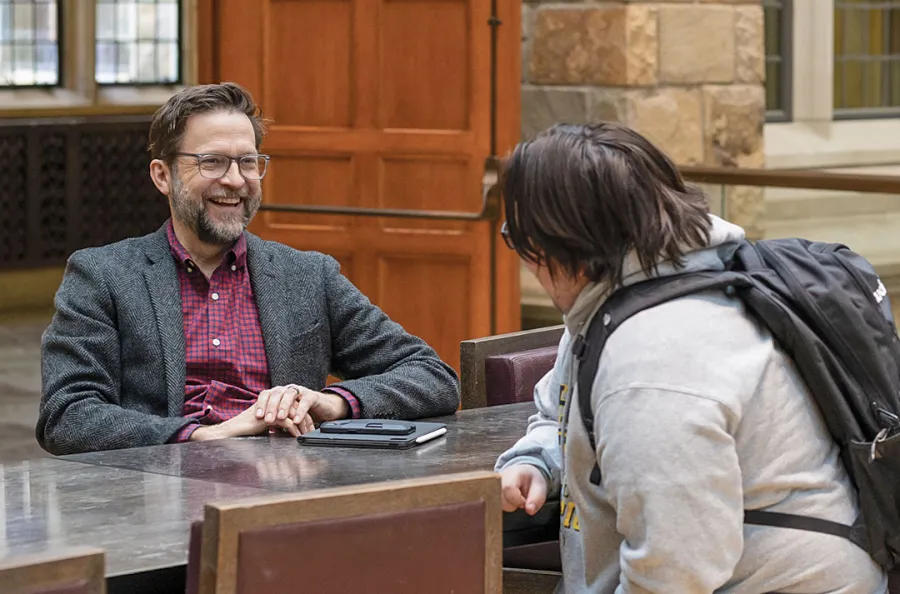
What do you believe is the future role of public law schools?
I’ve always thought that public law schools have a special obligation to produce their share of lawyers and research that serve the public interest, and I’m proud of the work we do toward that end. Our research faculty are working in every area of the law, and, through our clinics, our student-attorneys provide more than 75,000 hours of free legal services on average each year.
I also think being a public law school creates a heightened duty to make the first-rate education we provide accessible to students of varying means. For that reason, a focus of fundraising will continue to be, as it has long been, support for scholarships and other forms of financial aid, with the ultimate goal of reducing the average debt load of our graduates.
How would you describe your scholarship?
Over the course of my career I think it’s fair to say that my research has applied a behaviorally informed economic analysis to questions within private law, especially torts and insurance, and within public law, especially tax. Most of my work is normative and theoretical in nature, which means I ask questions such as how tort law, insurance law, or tax law might be changed to make the world a better place. Sometimes my focus is on improving the law’s efficiency; sometimes, it’s on improving distributional fairness; sometimes, both. Other parts of my work are more empirical in nature, which means I’m looking at various types of data to determine either what the law actually is on the ground or what consequences the law is having in the world. My current research, which includes some theoretical pieces and one empirical project, is concentrated in the area of insurance and financial regulation more generally.
Although it isn’t exactly scholarship, one project that I am especially proud of—and which took years to complete—is the Restatement of the Law of Liability Insurance, for which I was the associate reporter. The Restatement has had more influence on the law—in the sense of being cited by more courts in various jurisdictions—than any single piece of traditional scholarship I have produced.


